Special Operations and Diplomacy: A Unique Nexus
There has been a growing convergence of interest between diplomacy and special operations since the 9/11 terror attacks.
BY STEVEN KASHKETT
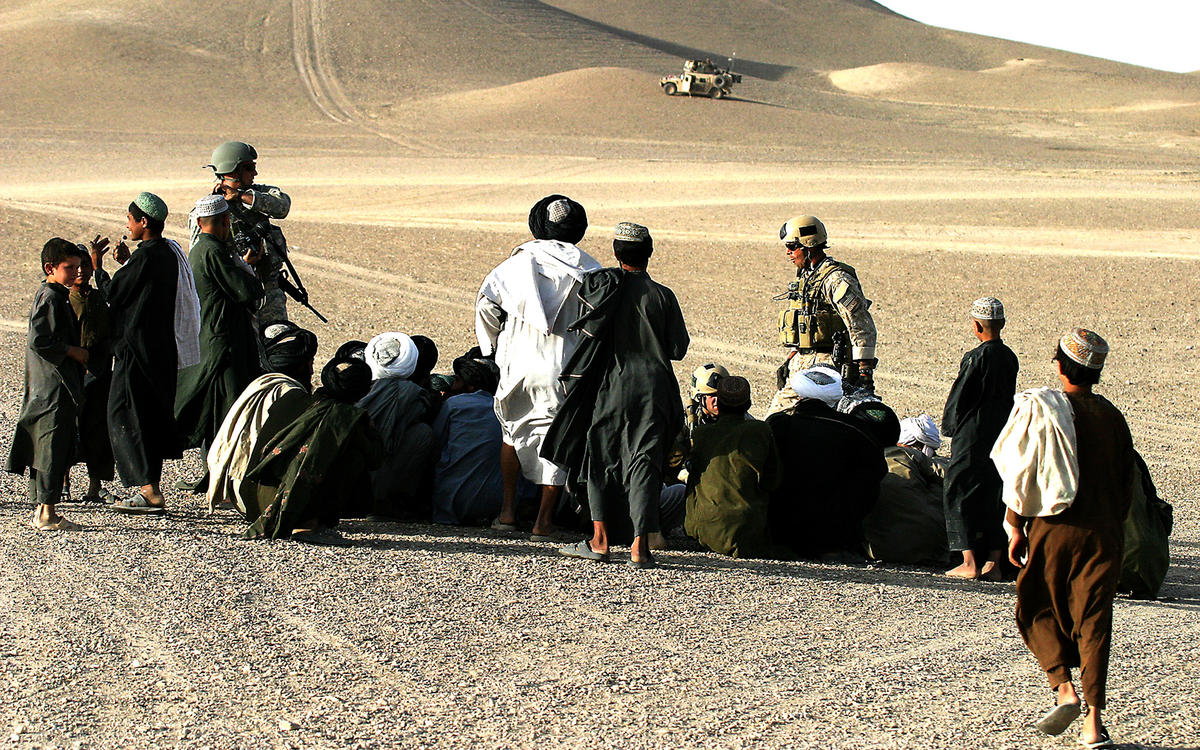
Marines from a Special Operations Company of the 1st Marine Special Operations Battalion meet with local leaders in the town of Qal’eh-ye Gaz in Afghanistan’s Helmand province to assist with medical needs and discuss their issues with anti-coalition forces operating in the area in August 2007.
U.S. Marine Corps Sgt. Ryan Davis
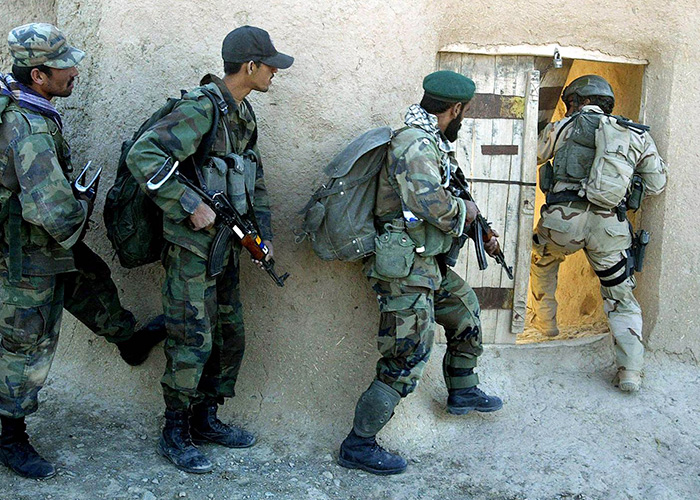
Afghan National Army soldiers watch as a Special Forces soldier kicks in the door to a home before clearing the house during a village search in Zabul province in September 2004. Afghan National Army soldiers assisted the Special Forces soldiers in the search for Taliban fighters in the remote village.
Steve Hebert
For most of us in the Foreign Service, one of the most striking developments in the 16 years since the 9/11 terror attacks has been a dramatic increase in synergy between the Department of State and the U.S. military. Coordination of our military and diplomatic activities overseas has become a guiding principle.
The shared role of the military and State Department civilians in managing the prolonged wars in Afghanistan and Iraq, the broadening of U.S. military operations across a variety of foreign areas, and the growing ascendancy of the military in foreign policy decision-making have all contributed to the realization that State and Defense must work together more effectively. Nowhere is this more evident than in the world of special operations.
Embedded State foreign policy advisers (POLADs) are now assigned throughout the special operations community within the U.S. military. This diplomatic presence extends not just to the U.S. Special Operations Command (SOCOM) based at MacDill AFB in Tampa, Florida, which oversees all special operations forces (SOF) worldwide, but also to the headquarters of each of the functional component special operations commands for the four branches of the military and to the theater special operations commands in each region of the world. At the same time, SOCOM has assigned its own dedicated SOF liaison officers to the State Department and more than two dozen U.S. embassies.
The convergence of interest between diplomacy and special operations can best be explained by understanding the unique— and often publicly misconstrued—activities that SOF elements undertake abroad.
U.S. Special Operations: Myth and Reality
Hollywood movies paint a picture of special operations as nothing but direct action: killing terrorists in nighttime raids, rescuing hostages, conducting drone strikes, blowing up facilities behind enemy lines and undertaking similar commando operations. To be sure, our SOF operators do conduct these kinds of kinetic, “tip-of the-spear” direct actions, which remain at the heart of the SOF mission and have taken the spotlight since 9/11. But there is much more to U.S. special operations.
Particularly over the past two decades, the U.S. special operations community has expanded its focus on cultivating relationships by using training and “soft” power initiatives to build partnerships between SOF forces and key local constituencies in other countries. Admiral William H. McRaven, the visionary SOCOM commander from 2011 to 2014, placed the highest emphasis on developing what has come to be called the “Global SOF Network” to link together the capabilities, expertise and collaborative efforts of the special operations forces of dozens of like-minded nations. An essential feature of this strategy is building trust through a wide range of “indirect” activities.
Today, U.S. special operators are engaged in this indirect approach on a daily basis in more than 100 countries. (The exact number of countries with an SOF presence is classified, but some reports assert that it is considerably greater than 100; 138 is the number cited in a Jan. 5 article in The Nation, “American Special Operations Forces Are Deployed to 70 Percent of the World’s Countries.”) Training SOF partners to build their capacity and fostering long-term relationships with them remains a central feature of the indirect approach. U.S. special operations expertise is unparalleled and highly sought after by foreign militaries, police forces and internal security organizations. Our elite special operators possess skills, tactics, specially designed equipment, and intelligence gathering know-how that can transform a foreign government’s own capabilities.
SOF training missions take place on a frequent basis, with the aim of creating friendly foreign partner SOF forces that can acquire the capacity to deal with regional threats themselves, without directly involving U.S. forces. Although much of this “sustained engagement” remains outside the public spotlight, there is no doubt that in places like Colombia, the Philippines, the Sahel countries of Central Africa and certain Middle Eastern states, training and assistance from U.S. personnel has made a decisive difference in the fight against extremist networks.
Like the ethos of career diplomats, the SOF philosophy recognizes the value of nurturing ties to foreign cultures.
Like the ethos of career diplomats, the SOF philosophy recognizes the value of nurturing ties to foreign cultures, and acknowledges the stability value of addressing the critical needs of civilians. As a result, U.S. special operations units around the world carry out a much broader civil affairs mission, which can include providing medical and public health services in underserved areas, assisting with agricultural and economic development at the village level, delivering disaster relief and furnishing humanitarian aid. Substantial assistance efforts by U.S. special operations were particularly noteworthy in Haiti and Nepal following major earthquakes in 2010 and 2015, respectively, and even in Japan after the 2011 earthquake and subsequent tsunami.
SOF teams deployed to various countries include doctors, veterinarians, engineers and logistics experts. There are numerous recent examples. In 2016, a team of SOF veterinarians conducted a seminar for local herders in Niger during which some 674 cattle, 464 goats, 52 camels and five donkeys received preventive treatment. In Georgia last year, SOF medical personnel conducted an assessment of health facilities to determine services available to refugees. In other countries, SOF teams carried out vaccinations and helped with rural development projects. Diplomatic Courier describes it this way in a 2013 article: “It is useful to think of SOF as the hard edge to soft power; their skills are the yin to the yang, and their activities regularly demonstrate that troops cannot be there solely to train and teach, or only to pursue kinetic solutions.”
Acquiring a sufficiently comprehensive picture of the “operating environment” on the ground to be able to anticipate changes that might favor extremism, as well as to enhance stability, win the hearts and minds of local leaders and local communities, and thereby reduce the conditions in which terrorist networks can thrive, are equally vital goals of the SOF’s soft-power activities. National security expert Linda Robinson explains it this way in the Nov.-Dec. 2012 Foreign Affairs: “The long-term relationships fostered by the indirect approach are conduits for understanding and influence. They are the basis for partnerships through which the United States can help other countries solve their own problems and contribute to increased security in their regions. In some cases, the partnerships grow into alliances, as other countries become willing to assist the United States in security missions elsewhere.”
Testifying before a congressional committee in 2013, Admiral McRaven stated: “The direct approach alone is not the solution to the challenges our nation faces today, as it ultimately only buys time and space for the indirect approach. … In the end, it will be such continuous indirect operations that will prove decisive in the global security arena.”
Embassies and SOF: Bound Together
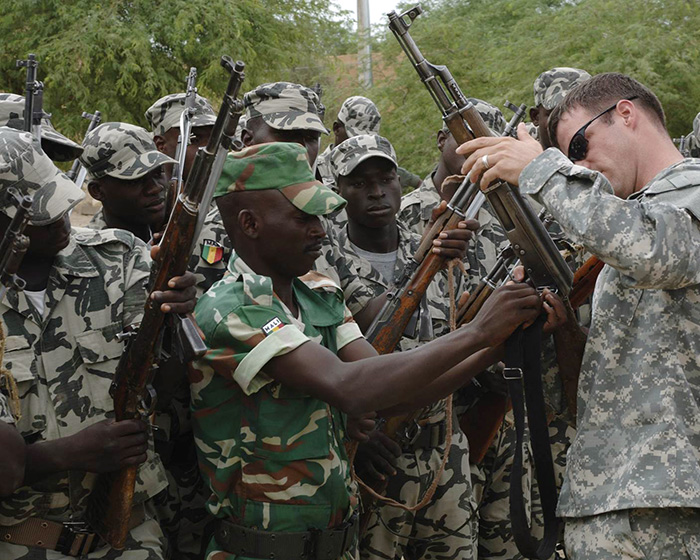
U.S. Army soldiers from the 3rd Special Forces Group help inspect Malian army soldiers’ weapons at their garrison in Tombouctou, Mali, in September 2007, during an exercise to foster relationships of peace, security and cooperation among the trans-Sahara nations. The exercise was part of the Trans-Sahara Counterterrorism Partnership, an integrated, multiagency effort of the U.S. State Department, U.S. Agency for International Development and the U.S. Defense Department.
U.S. Air Force / Master Sgt. Ken Bergmann
This wide range of activity, usually implemented by small SOF units with a light footprint, has expanded the U.S. special operations presence throughout virtually every region of the world, in many cases into countries where we have no conventional military forces. In the age of “Chief-of-Mission Authority”—the golden rule that since the 1950s has required all U.S. government personnel and activities in a foreign country to be approved by the ambassador—SOF operations inevitably necessitate close coordination with U.S. embassies. With few exceptions, for both direct action and indirect activities, SOF commanders are required to get the ambassador’s concurrence, seek the embassy’s clearance for the entry of SOF personnel and then keep the country team briefed on the status of the mission. Enforcing this rule is becoming a major task for embassies.
Direct action missions overseas take place only in exceptional circumstances outside of established war zones, but the campaign to disrupt violent extremist networks in critical threat countries has made them useful in recent years in places like Yemen, Mali, Libya, Somalia and Syria. It has also become quite commonplace for American military personnel to provide advice, intelligence and logistical support for strikes conducted by host-country SOF elements. In such instances, coordination with the State Department and the local U.S. embassy is vital because of the potential for public fallout and impact on the bilateral relationship.
Numerous cases highlight the need for close diplomatic-military coordination on kinetic actions that will take place on foreign soil, as well as the potential for serious friction and adverse effects on U.S. foreign policy objectives. Operation Neptune Spear, the 2011 SOF raid in which Osama bin Laden was killed, accomplished its purpose but sparked a protracted crisis in U.S.-Pakistan relations. An operation by a Navy SEAL team targeting the Islamic State group in Yemen late last year caused a backlash.
Public knowledge that the United States is involved with direct action missions by foreign partner special operations forces in an undeclared conflict zone—whether in the form of advice, intelligence sharing or actual combat support—can lead to negative repercussions within the country and the region. Many foreign partners prefer to keep their relationship with U.S. special operations out of public view for this reason, which helps explain why the details of so many of these partnerships remain classified. The State Department and its embassies have a strong incentive, therefore, to be kept fully in the loop and to retain the ultimate decision-making authority over these activities.
Even the choice of which foreign SOF partners to cultivate is subject to political sensitivities and foreign policy considerations. Throughout Latin America in recent decades, U.S. special operations engagement with partner forces in countries with poor human rights records deepened historical suspicion and distrust of the United States, sparking concern that those regimes were using what they learned from U.S. commando training against internal political opponents. In the minds of some critics, this cooperation with Latin American militaries made SOF synonymous with support for unsavory dictators.
By contrast with the conventional military, SOF often function in a dimension that shadows traditional diplomacy.
Today, U.S. special operators go to great lengths to avoid such perceptions, but close coordination of their activities with the State Department is critical to this effort. As Linda Robinson observes in Foreign Affairs, “Navigating the failings of partner governments, as well as civil strife and complex sectarian, ideological, or tribal conflicts, is extraordinarily difficult; and given the high risk of blowback, the United States must constantly assess whether special operations partnerships with non-U.S. forces are, on balance, advancing or compromising U.S. interests.” Despite attempts to enhance their political awareness through specialized training, SOF personnel can sometimes be tone-deaf to the foreign policy context in which they operate in so many different countries, and to the consequences for broader U.S. objectives. Career diplomats serving in those countries, who understand the local history and political culture—as well as POLADS themselves, who often have experience in the same regions or countries—are uniquely qualified to provide the necessary guidance.
Some indirect activities by special operations units overlap materially with what State and USAID programs are designed to accomplish in a country. Especially when working in the areas of economic development, public health and humanitarian assistance, SOF efforts inevitably stray into the space traditionally occupied by U.S. civilian foreign affairs agencies. For many, this kind of work is an essential part of diplomacy and therefore should stay under the control of civilian agencies. But the unfortunate reality is that while the special operations community has ample and growing resources, State and USAID have always labored within significant budget constraints and now face the threat of massive outright cuts.
Ambassadors must acknowledge that the best hope for preserving our ability to use “soft power” in many areas may well be to embrace the indirect activities of U.S. special operations forces. Both sides need to recognize the importance of coordinating and deconflicting their respective activities. Our special operations leadership is keenly aware that, as one recent State POLAD to SOCOM put it, they “could be whacking moles from now to eternity if we don’t address the root causes and fertile ground from which violent extremism emerges”—and that there can be little progress in this effort without State and USAID. This is why SOF leaders are among the most compelling advocates for State and USAID appropriations. Given that the SOF budget is likely to far outstrip civilian agencies’ funding under the current administration, however, there can be little doubt that developmental and humanitarian projects by special operations units will take on greater prominence as a tool of U.S. foreign policy.
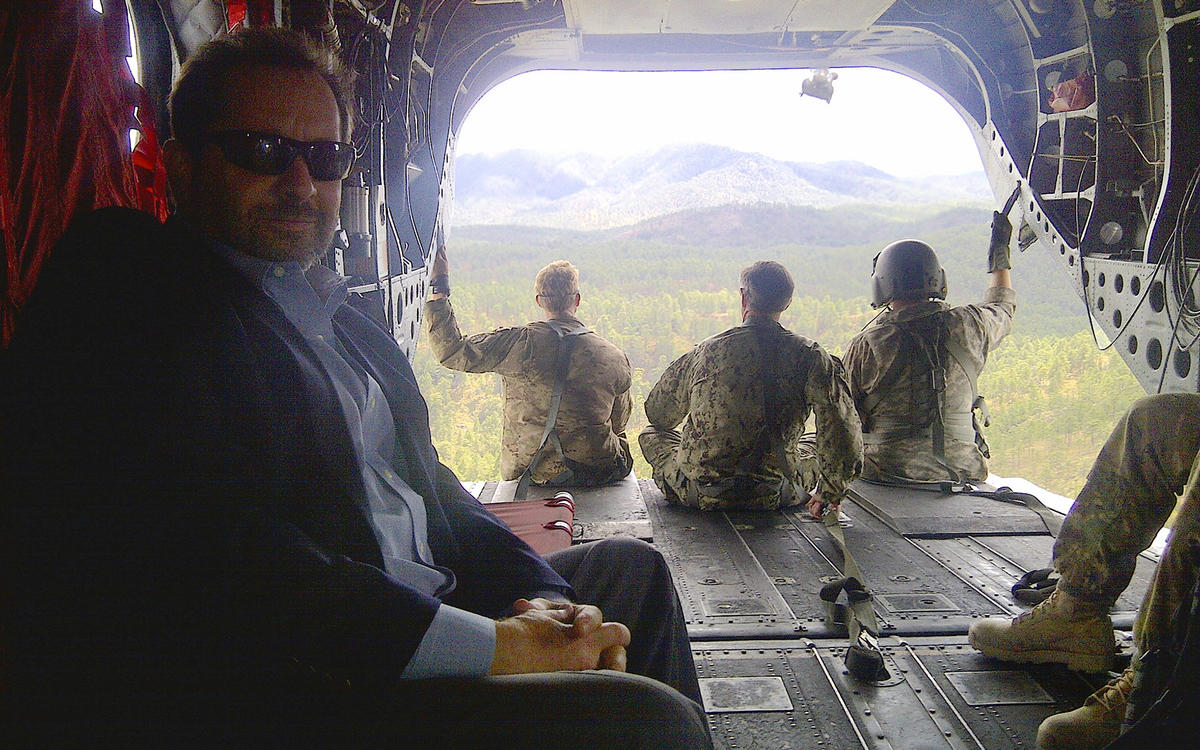
The author in a helicopter with the SOCOM commander over the Honduran jungle in 2013.
Courtesy of Steve Kashkett
Special Operations: Wave of the Future?
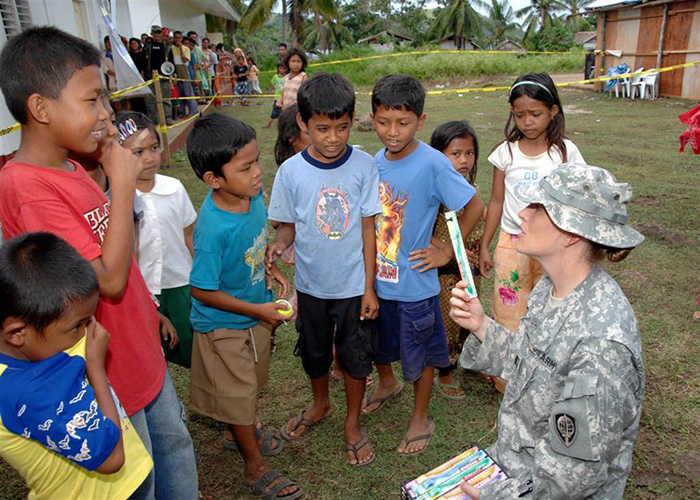
A U.S. Special Forces soldier distributes toothbrushes to a group of children as part of a public health campaign.
U.S. Department of Defense
At a time when the most pressing danger to U.S. national security comes from international terrorism and asymmetric threats from extremist networks spread across multiple countries—and when so much of our diplomacy revolves around building coalitions to combat these threats—special operations will inevitably have an increasingly central role in U.S. foreign policy. SOF have the primary mission of countering terrorism and violent extremism, as well as preventing the spread of nuclear, chemical and biological weapons. And this places it front and center in so much of what our diplomats are doing these days. Furthermore, foreign governments place enormous value on the assistance that elite U.S. special operators can provide in countering these threats. The offer of U.S. SOF support has frequently become a “deliverable” in negotiations with allies and even adversaries; in some instances, it is the most valuable asset we can offer.
By contrast with the conventional military, SOF often function in a dimension that shadows traditional diplomacy and provides additional options for dealing with thorny problems. General Joseph Votel, who served as SOCOM commander from 2014 to 2016, set forth this thinking in a January 2016 essay in JFQ: Joint Force Quarterly, “Unconventional Warfare in the Gray Zone.”
Gen. Votel articulates the role of SOF this way: “While ‘Gray Zone’ refers to a space in the peace-conflict continuum, the methods for engaging our adversaries in that environment have much in common with the political warfare that was predominant during the Cold War years. Political warfare is played out in that space between diplomacy and open warfare, where traditional statecraft is inadequate or ineffective and large-scale conventional military options are not suitable or are deemed inappropriate for a variety of reasons. … SOF are optimized to provide the pre-eminent military contribution to a national political warfare capability because of their inherent proficiency in low-visibility, small-footprint and politically sensitive operations. SOF provide national decision-makers strategic options for protecting and advancing U.S. national interests without committing major combat forces to costly, long-term contingency operations.”
Adversaries increasingly operate in this “gray zone.” Examples include Russia’s aggressive dissemination of disinformation through social media and other means, China’s deployment of military vessels disguised as civilian fishing boats and Iran’s harassment activities in the Strait of Hormuz that fall short of overt military provocations. All of these countries try to hide their recruitment of proxy forces in conflicts around the world. Significantly, General Votel was invited as a special guest to address SOF efforts in the “gray zone” and SOF-embassy relations at last year’s State Department chief-of-mission conference. A fellow speaker, the U.S. ambassador to Ukraine, praised the effectiveness of special operations activities in countering Russian propaganda in that country.
Because of its speed, flexibility, and specialized skills and weapons—distinctive capabilities for addressing the “gray zone” and subnational threats that have been pre-eminent since the beginning of the 21st century—it can be argued that special operations represents the wave of the future. While the conventional, general purpose forces of the U.S. military still have a number of important missions in preserving the peace around the world, a full-blown conventional war against the conventional military of a foreign power seems unlikely. Special operations played a far greater role in the wars in Afghanistan and Iraq than in any previous war, and the SOF “tip of the spear” raids and other pinpoint strikes were the keys to many of the successes that took place.
Numerous cases highlight the need for close diplomatic military coordination on kinetic actions that will take place on foreign soil.
As Gen. Votel has observed: “In the autumn of 2001, a small SOF element and interagency team, supported by carrier- and land-based airstrikes, brought down the illegitimate Taliban government in Afghanistan that had been providing sanctuary for al-Qaida. This strikingly successful unconventional warfare operation was carried out with a U.S. ‘boots on the ground’ presence of roughly 350 SOF and 110 interagency operatives, working alongside an indigenous force of some 15,000 Afghan irregulars.”
Against this backdrop, it is logical for U.S. diplomats to see the special operations community as a highly adaptable, singularly capable natural ally—and as a primary partner in the civilian-military diplomacy of the future. There are undeniably many risks and potential pitfalls ahead. It will be a challenge for the State Department and its career officers to retain primacy over the formulation and implementation of foreign policy in an era when quasi-autonomous military SOF teams are present in more than 100 countries and possess far greater operating resources. The personnel numbers alone are daunting: there are some 70,000 U.S. special operators worldwide, compared to fewer than 10,000 Foreign Service officers.
Some fear that the expansion of well-funded U.S. special operations activities into nearly 70 percent of the countries of the world will somehow overwhelm traditional civilian diplomacy and render it obsolete. This concern overlooks the fact that SOF is ill-equipped to replace many of the key functions of embassies: maintaining a high-level dialogue with host governments on vital bilateral issues, reporting and analyzing political-economic developments, providing assistance to U.S. citizens abroad, and conducting the public outreach and educational and cultural exchanges that embody U.S. public diplomacy. Special operations teams will not usurp these roles.
But in a world where asymmetric, non-state extremist networks and unconventional “gray zone” warfare represent the greatest threat to international security, SOF will have a growing role to play as a foreign policy instrument alongside traditional diplomacy.
Read More...
- “Counterinsurgency from Vietnam: Lessons from Today”
- “Working with the U.S. Military: 10 Things the Foreign Service Needs to Know”
- “Lessons Learned: USAID Perspectives on the Experience with Provincial Reconstruction Teams (PRTs) in Afghanistan”
- “Adaptability and Mobility: An Afghanistan PRT Field Report”












